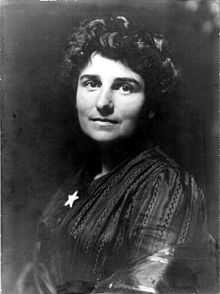Maud Ballington Booth

Maud Elizabeth Charlesworth (September 13, 1865 – August 26, 1948) later changed her name to Maud Ballington Booth, was an Salvation Army leader and co-founder of the Volunteers of America.[1]
She was born in Limpsfield, near Oxted, Surrey, England, the daughter of the local Anglican rector. One of three girls, she was a sister to bestselling romance novelist, Florence L. Barclay. The work of her parents in social issues led to Maud’s interest for social welfare and social service. In 1882, she became a companion of Miss Catherine Booth in organizing a branch of the Salvation Army in Paris. There she remained two years, then went with a party of Salvationists to Switzerland, where, after suffering vicissitudes and even imprisonment, she finally succeeded in establishing a Salvation Army corps. Afterward she went to London slums until her marriage to the second son of the founder of the Salvation Army, Ballington Booth in 1886.
In 1896, Ballington and Maud co-founded the Volunteers of America. Maud was also known for working to improve the conditions of prisons in the late 19th and early 20th centuries.[1] She later toured on the Chautauqua circuit, moving audiences with her vivid account of life in prisons and calls for reform. Her publications include:
- Branded (1897)
- After Prison —What? (1903)
- Twilight Fairy Tales (1906)
Among the other causes she embraced was the legalization of euthanasia.[2]
References
- ↑ 1.0 1.1 "Booth, Maud Ballington". Learningtogive.org. Retrieved July 1, 2005.
- ↑ Appel, Jacob (2004). "A Duty to Kill? A Duty to Die? Rethinking the Euthanasia Controversy of 1906". Bulletin of the History of Medicine 78 (3): 614.
External links
|